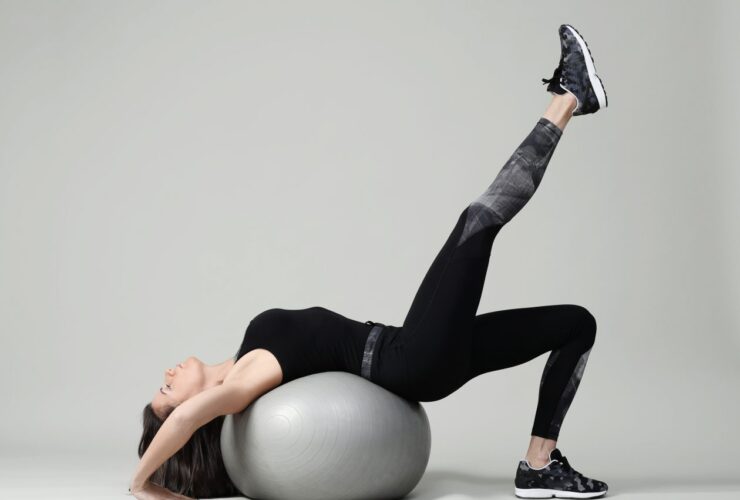Introduction
Sweating is frequently interpreted as a sign of calorie burning and a successful workout. Many people believe that they will lose more weight if they sweat more. This widespread misconception has led to the popularity of hot yoga programs, saunas, and strenuous aerobic exercises designed to induce excessive perspiration. However, the extent to which sweating contributes to weight loss and the question ‘Does sweating help you lose weight?’ remains uncertain.
Contrary to popular perception, significant weight loss cannot be achieved solely by sweating. While sweating results in a temporary weight decrease due to water loss, this reduction does not indicate fat loss. Sweating primarily serves to cool the body and regulate temperature during physical activity or exposure to high temperatures. Therefore, sweating does not equate to significant calorie burning or fat loss despite the temporary sensation of feeling lighter.
Understanding the science behind calorie burn and fat loss is crucial in evaluating the role of sweating in weight loss. Although sweating involves energy expenditure, the calories burned alone are minimal compared to those burned through physical activity. Furthermore, sweating is one factor among many, including genetics, metabolic rate, dietary habits, and overall activity level, influencing weight loss. As such, it is insufficient to rely solely on sweating as a weight loss strategy, although it remains a normal and healthy bodily response to physical activity.
Understanding the Science of Sweating

Sweating is a normal physiological process your body uses to control its temperature, especially while exercising or in a hot environment. Your brain tells your sweat glands to start secreting perspiration when your body heats up, whether from physical activity or outside conditions like high temperatures. Sweat helps disperse heat from your skin, cooling your body and preserving a steady internal temperature.
Water makes up most of the sweat, with trace amounts of electrolytes like sodium, potassium, and chloride. Along with being essential for many biological processes, such as neuron and muscle function, these electrolytes also assist in preserving the body’s fluid equilibrium. Excessive sweating can cause you to lose a lot of water and electrolytes, which can cause dehydration if they are not properly replaced. This is especially true during vigorous workouts or in warm weather.
Many people believe that sweating causes one to lose weight and attribute this association to sweating during exercise or sauna sessions. Perspiration can cause a brief water weight loss, but long-term fat loss is not the same. You may feel lighter and seem smaller on the scale when you lose water weight, which happens when your body excretes extra fluid. But this weight loss is only transient; as soon as you hydrate again, it swiftly returns.
Contrary to popular assumption, sweating does not cause substantial fat-burning or weight reduction. Instead, sweating promotes other physiological changes. Sweating is not the main method of burning fat, even though physical activity, especially those that cause perspiration, can gradually assist in establishing a calorie deficit and encourage fat loss. Rather, when you eat less than you burn, your body uses the fat that has been stored as energy, which results in fat loss. Sweating is a healthy and normal physical reaction. Still, it should only be considered one component of a complete weight-management strategy that includes a balanced diet, frequent exercise, and enough hydration.
Separating Fact from Fiction: Calorie Burn and Weight Loss

Your body naturally creates sweat when you exercise or perform intensive workouts because it is heating up internally. Since sweating is a sign that your body is working harder to control its temperature, it is frequently linked to burning calories. It’s important to understand, though, that sweating alone does not equate to a substantial expenditure of calories. The amount of sweat produced during an exercise does not always correspond to the number of calories burned, even if sweating might indicate increased energy expenditure.
Contrary to popular belief, sweat does not necessarily result in weight reduction. Sweating does not directly cause fat to burn, while it may help with water weight loss. Rather, when your body is in a calorie deficit—that is, when you take in fewer calories than you burn—fat loss happens. Consequently, even while sweating might be a side effect of calorie-burning workouts like cardiovascular or high-intensity interval training (HIIT), weight loss ultimately depends on the balance of energy in the body.
Knowledge of weight reduction requires understanding the concept of a calorie deficit. Creating a calorie deficit through calorie restriction, increased energy expenditure from physical activity, or a combination of the two is necessary for effective weight loss. Sweating might help you use more energy when working out, but the main goal should be to create a long-lasting calorie deficit with a healthy diet and consistent exercise. You can lose weight gradually and sustainably by keeping a calorie deficit over an extended period.
Your workout’s duration and intensity greatly impact how many calories you burn and how much weight you lose. Workouts that need more energy, like weight training, cycling, or running, usually burn more calories than workouts that require less power. Longer workouts can also result in higher total energy expenditure. Therefore, to optimize calorie burn and assist your weight reduction objectives, mix longer, high-intensity activities with shorter, slower sessions in your fitness regimen. To prevent overstretching and reduce the chance of injury, pay attention to your body and gradually increase the duration and intensity of your workouts.
Risks and Considerations
When the body loses more fluid than it takes in, it becomes dehydrated. This can cause an imbalance in electrolytes and other problems. Excessive perspiration can contribute to this condition. Feelings like weariness, dry mouth, thirst, and lightheadedness can all be signs of dehydration. People are more likely to become dehydrated because they sweat more during vigorous physical activity or hot conditions. It’s critical to replenish lost fluids and maintain appropriate hydration levels by drinking water regularly, especially before, during, and after exercise.
It is called hyperhidrosis when perspiration exceeds what is required to maintain body temperature. Even while at rest or in calm situations, people with hyperhidrosis may sweat, which can have a major negative influence on their everyday lives and emotional health. While sweating is a normal physiological reaction, those with hyperhidrosis may find it uncomfortable and embarrassing. In cases when excessive sweating causes discomfort or interferes with daily activities, it’s critical to identify the symptoms of hyperhidrosis and seek medical attention.
Proper hydration and electrolyte balance are essential for regulating perspiration and general health. Electrolytes, including salt, potassium, chloride, and water, comprise most sweat and are vital for sustaining biological processes and fluid equilibrium. Staying well hydrated is important to assist in lubricating joints, delivering nutrients and oxygen to cells, and controlling body temperature.
Conversely, electrolytes control nerve impulses, muscular contraction, and fluid equilibrium. Drinking electrolyte-containing liquids, such as coconut water or sports drinks, is crucial to maximize perspiration management, especially after extended or strenuous exercise. Nuts, fruits, and vegetables are foods high in electrolytes that you can include in your diet to assist in maintaining general hydration and restore electrolyte levels.
Perspiration is a normal physiological activity that aids in temperature regulation and removing pollutants; however, it’s important to be aware of the possible hazards and issues related to excessive sweating. Factors affecting sweat management and general health include dehydration, hyperhidrosis, and electrolyte imbalance. One can successfully regulate sweat levels and support optimal health and performance by remaining hydrated, identifying hyperhidrosis symptoms, and maintaining electrolyte balance.
Practical Weight Loss Strategies
Regular exercise and healthy eating habits are crucial to sustainable weight loss. Sweating when exercising may indicate increased calorie expenditure, but it’s vital to realize that calorie intake, expenditure, and metabolic rate all work together to cause weight loss. While strength training exercises gradually increase muscle and speed up metabolism, aerobic exercises like cycling, swimming, or jogging can assist burn calories and enhance cardiovascular health. Furthermore, dieting, like portion control and consuming full, nutrient-rich meals, can help manage weight and improve general health.
In addition to burning calories, exercise is essential for gaining lean muscle mass, which can have long-term impacts on metabolism. Sweating during a workout may be a sign of increased energy expenditure, but exercise has advantages that go beyond burning calories. Exercises that focus on building muscle, namely strength training, raise the body’s resting metabolic rate or the amount of calories burned while at rest. You may optimize metabolic function and burn more calories during workouts by combining aerobic and resistance training exercises into your fitness regimen for long-term weight loss.
Establishing good eating habits and frequent exercise are crucial to reaching and maintaining a healthy weight. Limit processed foods, sugary snacks, and high-calorie beverages in favor of a balanced diet of fruits, vegetables, lean proteins, and whole grains. Controlling portion sizes and eating thoughtfully can help you avoid overindulging and achieve weight management objectives. You may establish a positive relationship with food and increase your chances of successful long-term weight loss by making tiny, sustainable adjustments to your eating patterns.
Consult a licensed nutritionist, certified personal trainer, or healthcare professional for individualized advice and assistance during your weight loss journey. These professionals can offer advice for your needs, interests, and objectives. A physician can provide medical guidance and track your development, and a dietitian can assist in creating a well-balanced food plan that satisfies your dietary needs. Working with a personal trainer can also guarantee that you adhere to a safe and efficient workout regimen that caters to your goals and fitness level. Never be afraid to ask for help from a professional if you want to maximize your weight loss efforts and get results that endure.
Does Sweating Help You Lose Weight?

A. Answer in Short:
Sweating alone does not directly lead to weight loss. While sweating indicates increased exertion and calorie expenditure during physical activity, it primarily helps regulate body temperature and cool the body down. However, the amount of sweat produced does not necessarily correlate with the fat burned. Weight loss occurs when there is a calorie deficit, meaning you burn more calories than you consume. Therefore, while sweating can be a byproduct of exercise, it’s not the sole determinant of weight loss.
B. Answer in Depth:
The belief that sweating helps in weight loss is a common misconception. Sweat is primarily composed of water and electrolytes, and the amount of sweat produced varies based on genetics, environment, and physical exertion level. Sweating is the body’s natural response to regulate temperature, particularly during exercise or in hot conditions. While sweating can result in temporary water weight loss due to fluid loss, this weight loss is quickly regained through rehydration.
Furthermore, sweating itself does not lead to significant fat loss. Weight loss occurs when the body burns more calories than it consumes, creating a calorie deficit. While exercise, which often leads to sweating, can contribute to calorie expenditure, the key to sustainable weight loss lies in regular physical activity, balanced nutrition, and lifestyle habits. Therefore, while sweating may indicate physical effort, it does not directly cause weight loss.
In summary, while sweating is a natural bodily process that occurs during physical activity and helps regulate temperature, it does not directly result in weight loss. Weight loss is achieved through a calorie deficit, which requires burning more calories than consumed over time. While incorporating exercise into your routine, including activities that induce sweating, is beneficial for overall health and fitness, focusing on creating a sustainable lifestyle that includes balanced nutrition and regular physical activity for long-term weight management is essential.
FAQ Section:
Q: Do you burn fat when you sweat?
A: While sweating indicates increased calorie expenditure, it doesn’t directly mean fat loss. Sweat primarily consists of water and electrolytes; weight lost through sweat is quickly regained upon rehydration. Sustainable fat loss occurs through a calorie deficit, achieved by burning more calories than consumed over time, typically through exercise and dietary adjustments.
Q: Is sweat a good indicator of weight loss?
A: Sweat is not a reliable indicator of weight loss. While sweating can result in temporary water weight loss, it doesn’t reflect fat loss. Weight loss should be measured over time through changes in body composition and overall health markers rather than relying solely on sweat as an indicator.
Q: How do I know I’m burning fat?
A: Signs of fat burning include increased energy levels, improved physical endurance, and changes in body composition over time. However, focusing on sustainable lifestyle habits such as regular exercise, balanced nutrition, and adequate rest is essential rather than fixating on immediate indicators like sweating.
Q: Does sweating at night help you lose weight?
A: Sweating at night is primarily a response to changes in room temperature or bedding material and isn’t directly linked to weight loss. While nighttime sweating can lead to temporary water weight loss, it’s not an effective or sustainable method for losing fat.
Q: What is the laziest way to burn calories?
A: Incorporating small lifestyle changes such as standing more, taking short walks, or doing light stretching throughout the day can help burn extra calories without intense exercise. These activities, known as non-exercise activity thermogenesis (NEAT), can add up and contribute to overall calorie expenditure.
Q: How do you burn fat fast?
A: Rapid fat loss isn’t sustainable or healthy in the long term. Instead of focusing on quick fixes, aim for gradual, sustainable fat loss through regular exercise, balanced nutrition, and adequate sleep. Consistency and patience are key to achieving and maintaining healthy weight loss.
Q: Which part of the body loses fat first?
A: Fat loss patterns vary depending on genetics, hormones, and individual body composition. Generally, fat tends to be lost proportionally throughout the body, but certain areas may show more visible changes earlier, such as the face or abdomen.
Q: Does sweating have any benefits?
A: Sweating helps regulate body temperature, remove toxins, and improve circulation. Additionally, engaging in activities that induce sweating, such as exercise or sauna sessions, can benefit cardiovascular and mental health. However, sweating alone isn’t a guarantee of weight loss.
Q: What burns the most calories?
A: High-intensity exercises such as interval training, running, and cycling typically burn the most calories per session. However, the most effective exercise for calorie burn is one you enjoy and can sustain consistently over time.
Q: Do you lose weight when you don’t eat all day?
A: While skipping meals can lead to temporary weight loss due to calorie restriction, it’s not a healthy or sustainable approach. Severely restricting food intake can slow down metabolism, lead to nutrient deficiencies, and negatively impact overall health in the long term.
Q: How do you burn body fat?
A: To burn body fat, focus on creating a calorie deficit through regular exercise and balanced nutrition. Incorporate cardiovascular exercises and strength training to maximize fat burning and preserve lean muscle mass.
Q: Is it good to sweat a lot during exercise?
A: Sweating during exercise is a natural response that helps regulate body temperature and cool the body down. It indicates increased exertion and calorie expenditure, which can benefit overall health and fitness.
Q: Does sweating burn belly fat?
A: Sweating alone doesn’t target specific areas of fat loss, including the belly. To reduce belly fat, focus on weight loss through regular exercise, balanced nutrition, and lifestyle habits.
Q: Is sweating a sign of weight loss?
A: While sweating can be a byproduct of physical activity, it doesn’t directly indicate weight loss. Weight loss occurs through a calorie deficit, achieved by burning more calories than consumed over time.
Q: How much weight can you lose by sweating?
A: Weight lost through sweating is primarily water weight and varies depending on the duration and intensity of physical activity, environmental conditions, and individual metabolism. This weight loss is quickly regained upon rehydration.
Q: Can you lose weight by sweating in your sleep?
A: Sweating during sleep primarily responds to changes in room temperature or bedding material and isn’t directly linked to weight loss. Weight loss occurs through sustained calorie deficit over time, not solely through nighttime sweating.
Q: Will I sweat less if I lose weight?
A: Weight loss can lead to changes in sweat production for some individuals due to improved thermoregulation and metabolic changes. However, sweating patterns vary among individuals and are influenced by genetics, fitness level, and environmental conditions.
Q: Does walking without sweating burn calories?
A: Walking without sweating still burns calories, albeit at a lower rate than more intense activities. Non-exercise activities such as walking contribute to overall calorie expenditure and can benefit weight management and overall health.
Q: How many calories does sweating burn?
A: The number of calories burned through sweating varies depending on factors such as body weight, duration, intensity of physical activity, and environmental conditions. However, sweating itself doesn’t significantly contribute to calorie burn.
Q: Is sweating necessary for weight loss?
A: Sweating is not necessary for weight loss. While sweating can indicate increased calorie expenditure during physical activity, sustainable weight loss is achieved through regular exercise, balanced nutrition, and lifestyle habits.
Conclusion
Sweating is a sign of increased energy expenditure rather than weight loss. Sweating is a normal biological process that mostly aids in controlling body temperature and eliminating extra heat, while it can also help burn calories when exercising. However, long-term, consistent calorie deficits brought about by a mix of regular exercise, a healthy diet, and lifestyle choices are what lead to fat loss.
It’s important to have a holistic approach to weight loss that considers many facets of health and wellness rather than relying only on sweating. This entails regular exercise, choosing wholesome foods, emphasizing hydration, controlling stress, and getting enough sleep. People can accomplish long-term weight loss and general well-being by adopting a balanced lifestyle.
Adopting a healthy lifestyle can contribute to long-term success, even though sweating might not be the silver bullet for weight loss. It’s critical to approach weight control with consistency, patience, and reasonable expectations. People can improve their quality of life and reach their fitness and health objectives by adopting small, sustainable adjustments to their habits and behaviors.
Reference
Munson, Marty. 2019. “Can Sweating Make You Lose Weight?” Men’s Health. Men’s Health. July 30, 2019. https://www.menshealth.com/health/a28552492/does-sweating-make-you-lose-weight/.
“Sweating a Lot Doesn’t Necessarily Mean Losing Weight.” 2019. Vinmec.com. 2019. https://www.vinmec.com/en/news/health-news/healthy-lifestyle/sweating-a-lot-doesnt-necessarily-mean-losing-weight/.
https://www.facebook.com/Health. 2021. “Does Sweating a Lot during a Workout Mean I’m Burning More Calories?” Health. 2021. https://www.health.com/fitness/does-sweating-burn-calories.
TIMESOFINDIA.COM. 2022. “Does Sweating Make You Lose Weight?” The Times of India. Times of India. July 21, 2022. https://timesofindia.indiatimes.com/life-style/health-fitness/weight-loss/does-sweating-make-you-lose-weight/photostory/93005939.cms.
Miller, Korin. 2023. “Does Sweating Help You Lose Weight? Experts Explain.” Prevention. Prevention. October 3, 2023. https://www.prevention.com/weight-loss/a45269780/does-sweating-help-you-lose-weight/.
Chertoff, Jane. 2023. “Does Sweating Help You Burn More Calories?” Healthline. Healthline Media. September 25, 2023. https://www.healthline.com/health/does-sweating-burn-calories.
Was this helpful?

Joseph Emb, RDN
Founder of StyleVitally.com | Registered Dietitian & Wellness Advocate
What I Cover:
I’m passionate about connecting nutrition science and everyday wellness to help people live healthier, more vibrant lives. I write about evidence-based nutrition, mindful eating, sustainable lifestyles, and holistic well-being at StyleVitally.com.
My Background:
The University of Texas in Austin, where I earned my Dietetics diploma, laid the groundwork for my nutrition and health career. My training and hands-on experience taught me the science and art of using nutrition to enhance health and well-being.
Professional Journey:
I’m an RDN with lots of experience. I’ve helped people seeking tailored nutritional recommendations in clinical settings and community outreach programs. My constant learning and professional development ensure that my recommendations are always based on the latest evidence.
Ethical Commitment:
My practice prioritizes integrity. My content is transparent and objective, following the most significant ethical standards. I can give my audience unbiased advice because I’m not affiliated with food businesses or industry associations. I want to help people make informed health decisions that match their values and ambitions.
Join Me on the Wellness Journey:
Join me on the path to vitality and well-being, whether facing nutritional issues, seeking sustainable lifestyle changes, or simply wanting a better, happier you. We’ll discover how diet, mindfulness, and holistic well-being can maximize your potential.






